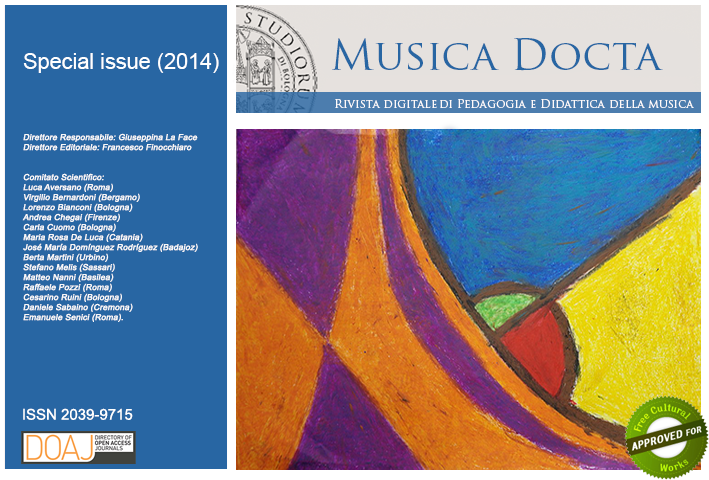The intellectual task of musicologists in the building of a European citizenship
DOI:
https://doi.org/10.6092/issn.2039-9715/4301Abstract
This paper, which has been proposed as keynote speech at the study session “Transmission of musical knowledge: constructing a European citizenship” (Rome, XIX IMS conference, July 6, 2012), suggests that it is important, and useful (in terms of both education and politics) for all citizens of the European Union, and for the foreigners who access the EU, to highlight the art music (Kunstmusik, musica d’arte) heritage, which constitutes one of the peculiar, distinctive features of European culture, and whose importance cannot certainly be reduced to the sphere of entertainment.
The art music heritage raises specific issues, first of all its composite nature. We have a material heritage, made of objects that require preservation (instruments, scores, treatises, documents, buildings designed for music performance); and we have an immaterial heritage – whose value can be aesthetic (works and events, i.e. music pieces to be performed or listened to) or intellectual (music texts, writings on music, theoretical and practical knowledge, performance techniques). The latter can only survive if it is taken care of and transmitted.
Knowledge of the European music heritage can be a powerful tool for integration in the building of a European citizenship, since it makes us aware that we have one common musical tradition, open and manifold. This provides a shared reference framework to the many local musical traditions scattered over the continent, and, at the same time, offers a reading key (by analogy and/or contrast) to groups of non-European citizens who come from different music cultures and aim at integrating into the Union.
In this process, musicologists can play a crucial role, if only they understand that one of the missions of their discipline is to educate and transmit musical culture. Music pedagogy and didactics are not separate fields - on the contrary, we must again look at them as a supporting branch, vigorous and thriving, attached to the trunk of musicology. Restoring this status should be primarily the task of musicologists.
Downloads
Pubblicato
Come citare
Fascicolo
Sezione
Licenza
Copyright (c) 2014 Giuseppina La Face, Lorenzo Bianconi
I diritti d'autore di tutti i testi nella rivista appartengono ai rispettivi autori senza restrizioni.
La rivista è rilasciata sotto una licenza Creative Commons Attribuzione Condividi allo stesso modo 4.0 Internazionale (codice legale completo).
Vedere inoltre la nostra Open Access Policy.
Metadati
Tutti i metadati dei materiali pubblicati sono rilasciati in pubblico dominio e possono essere utilizzati da ognuno per qualsiasi scopo. Questi includono i riferimenti bibliografici.
I metadati – riferimenti bibliografici inclusi – possono essere riutilizzati in qualsiasi formato senza ulteriori autorizzazioni, incluso per scopo di lucro. Chiediamo cortesemente agli utenti di includere un collegamento ai metadati originali.






